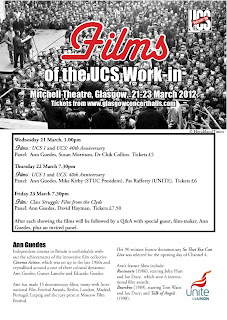Below is a media release issued last week announcing the screening of two unique films made during the UCS work-in. They are being screened between the 21-23 March, in Glasgow's Mitchell Theatre. Tickets are available from the Glasgow Concert Halls website www.glasgowconcerthalls.com.
 |
| Film screening flyers are available digitally from chrisbartter@btinternet.com |
Two contemporary films, shot by the only crew to be allowed into the Upper Clyde Shipyards during the Work-in are to be screened in Glasgow next month. And one of the original filmmakers, Ann Guedes, is flying in from Lisbon to take part in a series of panel discussions around the showings. This is the next event marking the 40 Anniversary of the famous Work-in.
The radical film collective, Cinema Action, formed by Ann, her deceased husband Eduardo Guedes and Gustav Lamche, followed the action around the Work-in as the Stewards took over the yards and prevented their run-down and butchery planned by the then Tory Government. The result was two unique films from the struggle. UCS 1 – a short (23 min) film depicting the workers strategy, how they gained community support for their campaign and took the fight right to the door of the Heath government; and Class Struggle: Film from the Clyde, a longer (83 min) documentary study of the Work-in, concentrating on the workers and shop stewards and their activity, running the yards and highlighting their fight to 'keep what is keepable'.
The films will be shown, along with a short history UCS 40th Anniversary , produced by Kevin Buchanan of the STUC written by historian John Foster, and narrated by prominent actor and director, David Hayman, over three nights 21-23 March 2012 in Glasgow's Mitchell Theatre. Tickets are available via the Glasgow concert Halls website – www.glasgowconcerthalls.com.
David Hayman will also be taking part in one of the panel discussions (on Friday 23 March) along with Ann Guedes. He said
“These films remind me what an extraordinary time it was. Suddenly a new way was possible in our world due to the courage of a group of hard-working men and women who seized the day with boldness and imagination. People power in action.”
Jimmy Cloughley, was one of the UCS Joint Shop Stewards committee, and had special responsibility for Communications both inside and outside the yard. He said that allowing the film crew in, paid off.
“We wanted to ensure that the viewpoint of the workforce was recorded, and Cinema Action did that job admirably. It was an historic struggle and an historic victory, and these films give a real flavour of the times. They are truly unique.”
Stephen Farmer was an apprentice during the Work-in. He was given the job of taking the crew around and got to know them very well. He says
“Ultimately I was laid off once my apprenticeship finished, but Cinema Action kept me on to continue working with them! Too often with working class history things aren't well recorded, and I'm proud that I did my bit, both in taking part, and in helping to ensure this one was recorded.”
The Work-in lasted 16 months from July 1971-October 1972 and finished when all four of the yards threatened with closure won a future. The 40th Anniversary celebrations have involved two sell-out concerts, an exhibition, a lecture by Professor John Foster and receptions given both by Glasgow City Council and in the Scottish Parliament. The events have been funded by UNITE, the union, who are one of the main inheritors of the unions involved in the Work-in.

No comments:
Post a Comment